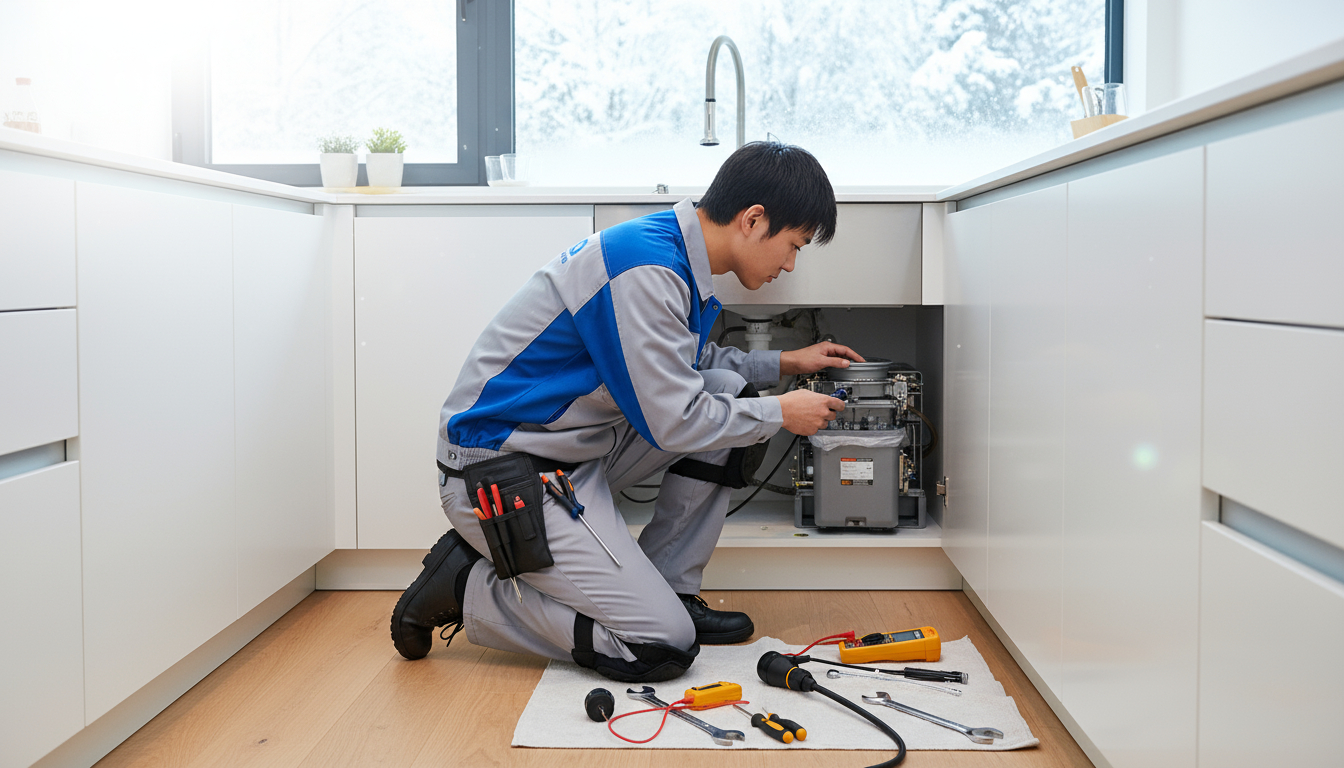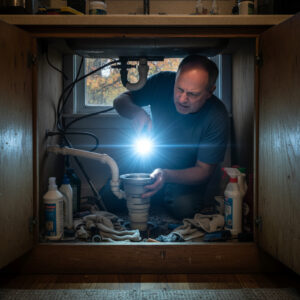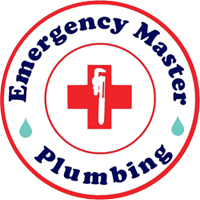

Garbage disposals are essential kitchen appliances that simplify waste management, but when they malfunction, homeowners often face the tough choice between repairing or replacing them. This guide explores common issues, diagnostic tips, and decision-making factors to help you resolve problems efficiently while saving time and money.
Understanding Garbage Disposal Basics
Garbage disposals, also known as food waste disposers, grind food scraps into small particles that can be flushed down the drain, preventing clogs and reducing household waste. Installed under the kitchen sink, they connect to the plumbing system and rely on an electric motor to operate. Most units last 8-15 years with proper care, but factors like usage frequency, maintenance, and the types of food processed can shorten their lifespan.

These devices come in various types, including continuous-feed models (which run as long as the switch is on) and batch-feed models (which require a stopper to activate). Understanding your model’s specifications is crucial for troubleshooting. For instance, a standard 1/2 horsepower unit suits small households, while larger families may need a 1 horsepower model for heavier loads.
Problems often arise from overuse, improper items being disposed (like bones or fibrous vegetables), or lack of maintenance. Ignoring early signs can lead to bigger issues, such as leaks or complete failure, potentially causing water damage or unpleasant odors in your kitchen.
Common Garbage Disposal Problems and Their Causes
Homeowners frequently encounter specific issues that disrupt daily routines. Identifying the root cause is the first step in deciding whether to repair or replace.
- Humming but Not Grinding: This occurs when the motor runs but the blades don’t move, often due to a jam from hard objects like utensils or fruit pits. It might also indicate a worn-out flywheel.
- Clogging and Slow Drainage: Grease, coffee grounds, or starchy foods like pasta can build up, restricting water flow. This is one of the most reported problems, affecting about 40% of disposal failures according to plumbing industry reports.
- Leaking: Water escaping from the unit could stem from loose connections, cracked housing, or deteriorated seals. Leaks under the sink might signal corrosion or installation errors.
- No Power or Complete Shutdown: Faulty wiring, a tripped reset button, or a burned-out motor can cause this. In older units, electrical components degrade over time.
- Unpleasant Odors: Bacterial buildup from food residue leads to smells. This is often preventable but can indicate deeper clogs if persistent.
- Overheating and Frequent Resets: If the unit shuts off repeatedly, it might be overloaded or have a failing motor, common in units over 10 years old.
These problems aren’t just inconvenient—they can lead to hygiene issues or higher water bills from inefficient drainage. For Phoenix residents, where hard water minerals accelerate wear, these issues may appear sooner.
Signs Your Garbage Disposal Needs Attention
Early detection prevents minor issues from escalating. Pay attention to these warning signs to assess if repair is feasible.
Unusual noises, like grinding or rattling, suggest loose parts or foreign objects. If the disposal vibrates excessively, it could mean unbalanced blades or mounting problems. Slow grinding or weak performance indicates dull blades or motor strain, often fixable with sharpening or cleaning.
Visual inspections are key: Check for leaks by running water and looking under the sink. Test the reset button—if it pops frequently, professional diagnosis is needed. Also, monitor for backups in the sink, which might point to plumbing line issues beyond the disposal itself.
In hot climates like Arizona, disposals can overheat more easily during summer, exacerbating these signs. If your unit is under warranty (typically 2-10 years), note the model number for potential free repairs.
When to Repair Your Garbage Disposal
Repairing is often the cost-effective choice for newer units or minor issues. Here’s how to evaluate and proceed.
For jams, try the hex wrench (Allen key) method: Insert it into the bottom of the unit and turn to dislodge obstructions. Always unplug the disposal first for safety. Cleaning with ice cubes and rock salt can sharpen blades and remove buildup—run cold water while grinding a cup of ice, followed by citrus peels for odor control.
Replaceable parts like seals, gaskets, or switches cost $10-50 and can extend the unit’s life. If the motor is intact but blades are dull, a professional sharpening might suffice. Repairs are ideal if the disposal is less than 8 years old and the problem isn’t structural.
However, DIY repairs have limits. Avoid forcing tools if you’re unsure, as this could worsen damage. For electrical issues, always consult a licensed plumber to prevent shocks or fires.
In Phoenix, where water quality affects plumbing, repairs might involve descaling mineral deposits. A simple repair job typically costs $100-250, including labor, making it worthwhile for functional units.
When to Replace Your Garbage Disposal
Replacement becomes necessary when repairs are uneconomical or the unit is beyond salvage. Consider these factors.
If the motor is burned out or the housing is cracked, repairs often exceed the cost of a new unit ($150-500). Age is a big indicator—units over 12 years are prone to repeated failures, and energy efficiency improves with modern models, potentially saving on utility bills.
Frequent breakdowns, such as needing resets multiple times a week, signal it’s time for an upgrade. Newer disposals offer features like noise reduction, auto-reverse for jams, and higher horsepower for better performance.
Environmental considerations matter too: Older models may not comply with current efficiency standards, leading to higher water usage. In areas with strict plumbing codes, like Phoenix, replacement ensures compliance.
When replacing, choose based on household size—opt for stainless steel grind chambers for durability against corrosion. Installation usually takes 1-2 hours for professionals, avoiding DIY pitfalls like improper sealing.
Cost Analysis: Repair vs. Replacement
Budget plays a pivotal role in your decision. Let’s break down the expenses.
Repair costs vary: A basic unclogging might be $75-150, while motor fixes can reach $300. Replacement, including the unit and installation, ranges from $250-700. Factor in long-term savings— a new, efficient disposal could reduce energy costs by 20%.
Consider opportunity costs: Downtime from a faulty unit might lead to manual waste handling or temporary clogs. Warranties on new units (up to 10 years) provide peace of mind, often outweighing short-term repair savings.
For Phoenix homeowners, local rebates on energy-efficient appliances might offset replacement costs. Always get quotes from reputable services to compare.
DIY Troubleshooting and Safety Tips
While professional help is recommended, some safe DIY steps can help diagnose issues.
Start by resetting the unit: Press the red button on the bottom. For jams, use tongs to remove visible debris from the top, never your hands. Run hot water and dish soap to clear grease buildup.
Safety first: Always disconnect power before any work. Wear gloves and eye protection. Avoid disposing of non-food items, bones, or oils to prevent future problems.
If DIY doesn’t resolve it, stop and call an expert to avoid voiding warranties or causing injuries.
Prevention and Maintenance Strategies
Proactive care extends your disposal’s life and minimizes problems.
- Run cold water for 30 seconds before and after use to solidify fats and flush particles.
- Avoid overloading: Grind small amounts at a time.
- Clean weekly with baking soda and vinegar to neutralize odors and dissolve buildup.
- Schedule annual inspections, especially in hard water areas like Phoenix, to catch issues early.
- Educate household members on what not to dispose: No eggshells, celery, or coffee grounds.
These habits can add years to your unit, reducing the repair-or-replace dilemma.
Choosing the Right Professional Help
When issues persist, expert intervention ensures safe, effective solutions. Look for licensed plumbers with experience in garbage disposal services, positive reviews, and transparent pricing.
In the Phoenix area, reliable services can handle everything from diagnostics to full installations, often with same-day response for emergencies.
For trusted garbage disposal repairs or replacements, we recommend Emergency Master Plumbing & Air. With years of experience serving Phoenix homeowners, they provide expert assessments to help you decide between repair and replacement. Contact them at 623-584-4706 for prompt, professional service.
